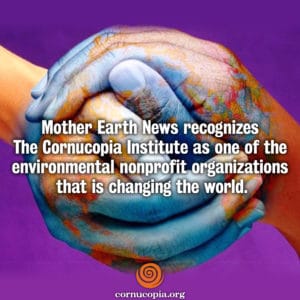Mother Earth News
by Shelley Stonebrook
 As we celebrate Earth Day this April, we salute some of our favorite environmental nonprofit organizations protecting the health of people, wildlife and our planet.
As we celebrate Earth Day this April, we salute some of our favorite environmental nonprofit organizations protecting the health of people, wildlife and our planet.
350.org. An international campaign dedicated to fighting climate change, 350.org gets its name from the maximum level of atmospheric carbon dioxide — 350 parts per million (ppm) — that climate scientists agree will maintain our planet’s long-term ecological health. Now, the level is 400 ppm, and it’s rising by 2 ppm each year. This group organizes in 188 countries and strives to revolutionize the climate movement.
Cornucopia Institute. This plucky nonprofit, headquartered in Cornucopia, Wis., supports sustainable agriculture and often challenges Big Ag and even the USDA — and wins. On Cornucopia’s website, you’ll find the latest updates regarding toxic pesticides, genetically modified foods and more, along with “score cards” that rate the sustainability of different food brands.
Earth Policy Institute. This group, founded by internationally renowned environmentalist Lester Brown and based in Washington, D.C., produces authoritative reports on global issues, as well as detailed roadmaps for how to solve interconnected environmental and social challenges. The Institute’s thorough reports on climate, energy, population, agriculture, transportation and more are clear and compelling.
Friends of the Earth. Whether via exposing corruption in Keystone XL pipeline proposals or persuading thousands of grocery stores not to carry genetically modified salmon, this nonprofit is a hard-hitting voice pressing for change locally, on the global stage, and politically in the halls of Congress.
Natural Resources Defense Council. The NRDC uses law, science and the support of 1.4 million members and online activists to protect wild places and foster a safe and healthy environment for people and wildlife alike. With a staff of more than 350 lawyers, the Council is one of the most powerful groups fighting to create a clean-energy future, protect endangered species and revive the world’s oceans.
Nature Conservancy. Since its foundation in 1951, this global conservation group has safeguarded more than 115 million acres of land from development. The Conservancy works with landowners, communities and businesses to achieve conservation goals.
Organic Seed Alliance. The leading organic seed institution in the United States, this group conducts organic plant-breeding and seed-production research, educates farmers, and advocates for national policies that strengthen and protect organic seed systems.
Pew Charitable Trusts. The Environment Group branch of the Pew Charitable Trusts is a global organization that advises international policymakers on many crucial environmental issues, which it divides into three categories: ocean, land and energy.
Sierra Club. The Sierra Club, founded in 1892, has an impressive, storied history and is one of the oldest and largest grass-roots environmental organizations in the United States. The group’s website is a hub of opportunities to participate in all sorts of environmental campaigns, from rallying against fracking to opposing carbon pollution.
Union of Concerned Scientists. This alliance of more than 400,000 citizens and scientists uses scientific analysis — not political calculations or corporate hype — to push for responsible changes in government policy, corporate practices and consumer choices. This nonprofit’s victories include helping establish higher fuel-efficiency requirements for vehicles and pass renewable-energy standards in many U.S. states.

